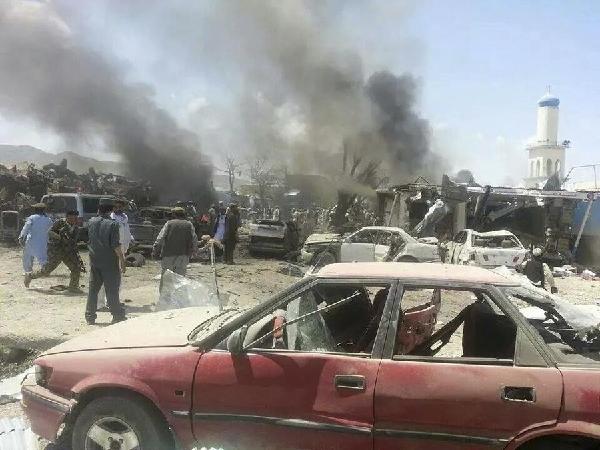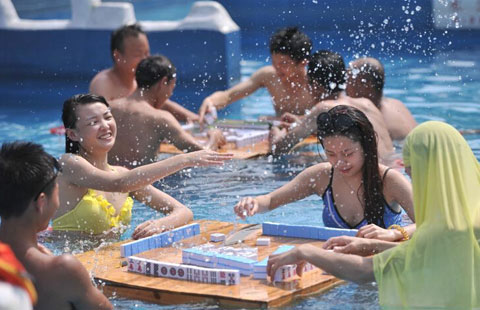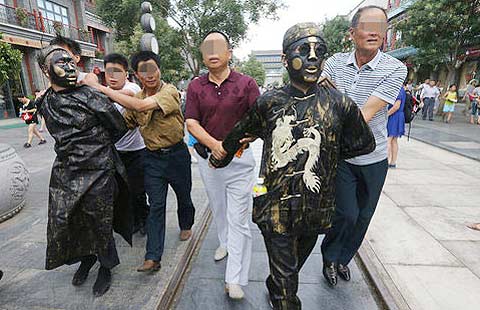89 killed in worst Afghanistan bombing since 2001
Updated: 2014-07-16 11:20
(Agencies)
|
|||||||||||
KABUL, Afghanistan - A suicide bomber blew up a car packed with explosives near a busy market and a mosque in eastern Afghanistan on Tuesday, killing at least 89 people in the deadliest insurgent attack on civilians since the 2001 US-led invasion.
|
|
| Villagers gather at the site of a car bomb attack in Urgon district, eastern province of Paktika, July 15, 2014. [Photo/Agencies] |
The blast destroyed numerous mud-brick shops, flipped cars over and stripped trees of their branches, brutally underscoring the country's instability as US troops prepare to leave by the end of the year and politicians in Kabul struggle for power after a disputed presidential runoff.
Gen. Mohammad Zahir Azimi, the Defense Ministry spokesman, said the bomber detonated his explosives as he drove by the crowded market in a remote town in Urgun district, in the Paktika province bordering Pakistan. Azimi gave the death toll and said more than 40 other people were wounded.
Nearby hospitals were overwhelmed, and dozens of victims were transported over dangerous roads to the capital, Kabul.
Ahmad Shah, a gas station employee who rushed to the site to help, said he loaded dozens of people who were injured or killed into vehicles.
"I saw the smoke, and the town was burning. There were dead bodies everywhere," he said outside a hospital in Kabul.
Associated Press video footage of the aftermath showed mounds of twisted debris and the charred shells of cars flipped over on top of one another. Azimi said more than 20 shops and dozens of vehicles were destroyed.
Many victims were buried in the rubble, said Mohammad Reza Kharoti, administrative chief of Urgun district.
"It was a very brutal suicide attack against poor civilians," he said. "There was no military base nearby."
There was no immediate claim of responsibility, and the Taliban issued a statement denying involvement, saying they "strongly condemn attacks on local people." Several other insurgent groups operate in Afghanistan.
The UN mission in Afghanistan said initial reports "suggest that the attacker prematurely detonated after police detected the explosives in his vehicle."
Several witnesses said the driver was in a four-wheel-drive vehicle and hit two vehicles parked on the edge of the market, leading police to open fire. Then the explosion happened.
Abdul Khan, who is from the area, rushed to the hospital in Kabul to donate blood. "Most of the people in the town lost three to four family members," he said, adding his cousin had been killed.
It was the deadliest insurgent attack against civilians since the US invasion that ousted the Taliban in 2001. It exceeded the toll from twin bombings on Dec. 6, 2011, that targeted Shiite Muslims and killed 80 people in Kabul and Mazar-i-Sharif.
It was also the first major attack since a weekend deal between the two Afghan presidential contenders, brokered by US Secretary of State John Kerry, averted a dangerous rift in the country's troubled democracy following last month's disputed runoff.
"People were shocked, and we are shocked, but this is the sad reality of Afghanistan," one of the candidates, former Foreign Minister Abdullah Abdullah, told The Associated Press in an interview.
The UN Security Council issued a statement condemning the attack, and said it would not stop the drive for an Afghan-led peace in the country.
Unofficial results from the runoff showed former Finance Minister Ashraf Ghani Ahmadzai well in the lead, but Abdullah's supporters say that is only because of widespread fraud.
Since fraud was alleged on both sides, the deal provides that every one of the 8 million ballots will be audited under national and international supervision over the next three or four weeks.
Neither the election nor the weekend deal has had any visible effect on security in the country, which has long seen near-daily attacks.
The United Nations said last week that civilian deaths are up 17 percent in the first six months of the year compared with the same period in 2013, with 1,564 civilians killed from January through June. The Taliban have escalated their bombing campaign ahead of the planned withdrawal of US-led foreign forces.
Hours before the Paktika blast, a roadside bomb in Kabul ripped through a minivan carrying seven employees of the media office of the presidential palace, killing two of the passengers. The Taliban claimed responsibility.
Also, seven police officers, including a district counter-terrorism director, and six border guards were killed when Taliban insurgents attacked a post on the border with Pakistan in the eastern Khost province, provincial government spokesman Mubariz Mohammad Zadran said.
Zadran said the attack set off an hours-long gunbattle that left 34 insurgents and a local man dead. "The majority of the insurgents killed in the clash are Pakistani citizens," Zadran said.
Elsewhere in the country, two police officers were killed by a bomb concealed on a parked motorbike inside the southern city of Kandahar, said Zia Durani, spokesman for the Kandahar police chief.
Related Stories
Bomber attacks Lebanese security checkpoint 2014-06-20 17:12
State Department says suicide bomber in Syria was US citizen 2014-06-01 07:22
Venezuela arrests alleged car bomber 2014-02-26 07:16
Suicide bomber kills four in Kabul attack 2014-01-26 14:55
13 killed as suicide bomber hits Pakistan 2014-01-20 16:22
Woman suicide bomber kills at least 14 at Russian station 2013-12-30 01:37
Today's Top News
Economic ties with Latin America grow
Space tickets take off in China
Ukraine shells Russian territory
Anti-Chinese slur sparks US fury
China wins WTO support in challenge to US tariffs
Man claims kingdom so daughter can be princess
German suspect was not in contact with spies: US
Xi makes 'symbolic' stop in Greece
Hot Topics
Lunar probe , China growth forecasts, Emission rules get tougher, China seen through 'colored lens', International board,
Editor's Picks

|

|

|

|

|

|






